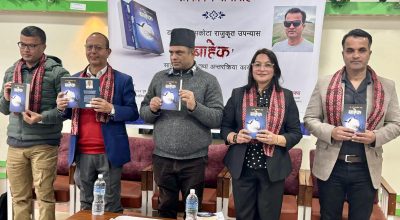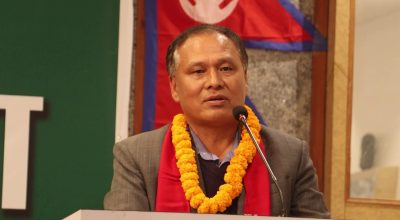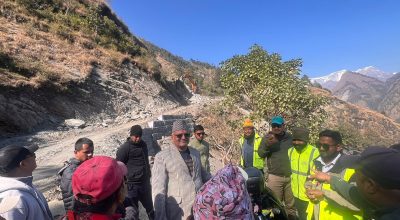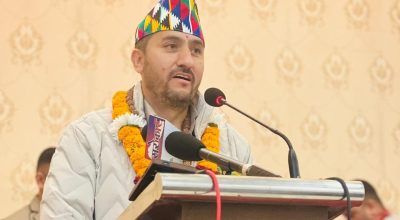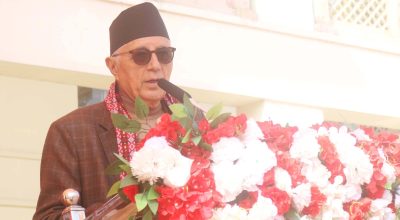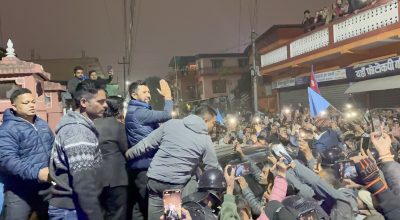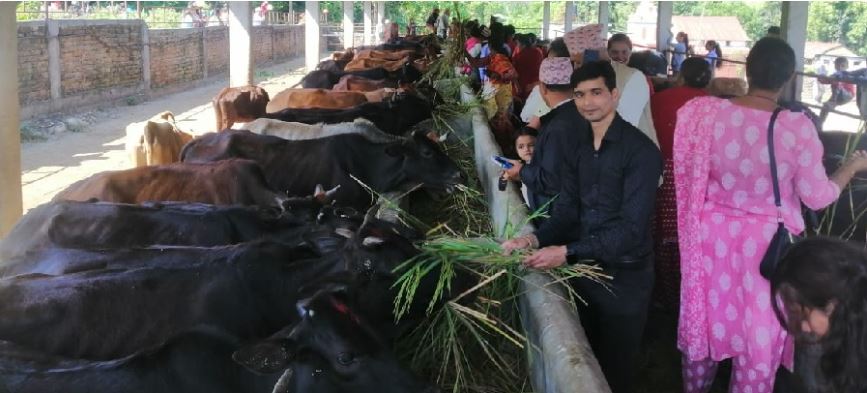
Sushila Regmi
Rampur, Palpa, May 1: Until some years ago, stray cattle in Rampur and surroundings had become a nuisance to local people. They would destroy crops, attack people and cause road accidents. Nowadays, the locals have got a relief, as ‘Gaushala’ (a shelter for cows) at Rampur Municipality in Palpa district has been established where such cows, oxen, and calves are given shelter and fodder.
Located near the Kaligandaki river banks in Rampur Municipality-6, the shelter came into operation four years ago with 108 cows under its custody in the beginning.
On the initiatives of the Municipality, approximately Rs 5.5 million has been invested in the construction of physical infrastructures for the shelter so far, said the municipality officials.
Physical infrastructures and fodder have been managed for the cattle with the total Rs 6.5 million provided by the Municipality in the past five years, Rs 600,000 provided by the provincial government, and Rs 1.1 million provided by the Patanjali Yoga Peeth, Nepal, they said. The shelter houses 158 cows at present.
Besides, people have donated fodder and money on occasions like birthday, marriage, after death rituals, and marriage anniversary. Last year, donation amounting to approximately Rs 400,000 was collected, and an estimation of Rs 600,000 worth of donation is estimated to be collected this year, said chairperson of the municipal Gaushala management committee, Humnath Neupane.
“People have donated money and other useful things for the shelter by cutting down expenditures on occasions like birthday, marriage and other auspicious days. This has indicated increasing importance of cows. The donation has been a great help to run the shelter,” he said.
With the exposure of the shelter through social sites like Facebook, local people have come together to collect donation to protect cows, said the shelter manager Nilkantha Bhandari.
Proper management of stray cattle through the shelter has relieved the local people, and helped reduce road accidents. With this, local people have been rid of stray cattle which would eat and destroy their crops, said a local Om Prakash Regmi.
In most cases, people tend to abandon cattle once they are no longer useful or they stop giving milk, and feeding and taking care of them becomes a financial burden for them. The government must monitor and manage stray cattle, he said.
With the management of stray cattle, the disturbance on traffic and road accidents caused by them have been reduced to some extent, said traffic police.
This has also helped develop the area as a religious tourist destination. Spanning around seven ropanis of land, the shelter is located just before the Laxminarayan Temple and near the banks of the Kaligandaki river considered to be a sacred.
It has a concrete compound in all four directions. There is a dense mobility of pilgrims and devotees who visit the area to take a holy dip into the river, worship at the temple and visit the cow shelter, said local people.
The number of people visiting the area for religious purpose is increasing, said the shelter authorities. Cow is the official national animal of Nepal. The cattle are considered to be the most sacred animal by Hindu people, and its entire body is believed to represent 330 million Hindu god and goddess. Hindu people worship cow daily and rear it for various purpose including worship. It is also worshipped as an incarnation of goddess Laxmi and is considered auspicious during birth and death of Hindu people.
The shelter has had a good impact on religious tourism as it is situated near the banks of the sacred Kaligandaki river, said Lekhnath Neupane, the municipality chief administration officer. As this has spread positive message elsewhere as well, the municipal government has accorded top priorities to manage the shelter, he added.
The municipality has a plan to monetise the shelter by producing gas from urine and dongs of cows taking a shelter here, said the municipality mayor Raman Bahadur Thapa. “As part of the municipal government’s plan to make the city get free of sewers, we have come up with a plan to produce energy from urine and dongs collected from the shelter. The municipal government will move ahead on the matter after holding talks with stakeholders,” he said.
It is also planning to construct a guesthouse for pilgrims visiting the religious site. For this, discussions with donors and various organisations are underway, he said. The committee has a plan on the table to create a pasture and a museum, construct a glasshouse and a statue of goddess Radha and god Krishna.
The shelter has a building for storing fodder, two buildings for housing stray cattle, an office building, and facilities like drinking water, and toilets. Five employees have been deployed, said the shelter authorities.
The shelter is facing problems however. A lack of space has been a major concern, said the shelter authorities. Separate buildings are required for pregnant and feeble cows, they said. The problem become so intense during winter when cows in general fall ill, they added. A lack of sufficient fodder has also added to the problems.
A secretariat should be managed, and a desk be set up to inform people about the shelter should take place. Likewise, crematory places and the building for performing after-death rituals should be constructed, they demanded.
The Gaushala management committee has distributed life membership by charging Rs 5,100 per person. Cows handed by the life members are kept in the shelter. It charges Rs 3,000 in fees per cow handed by them.
[Translated by Pritam Bhattarai] (RSS)






